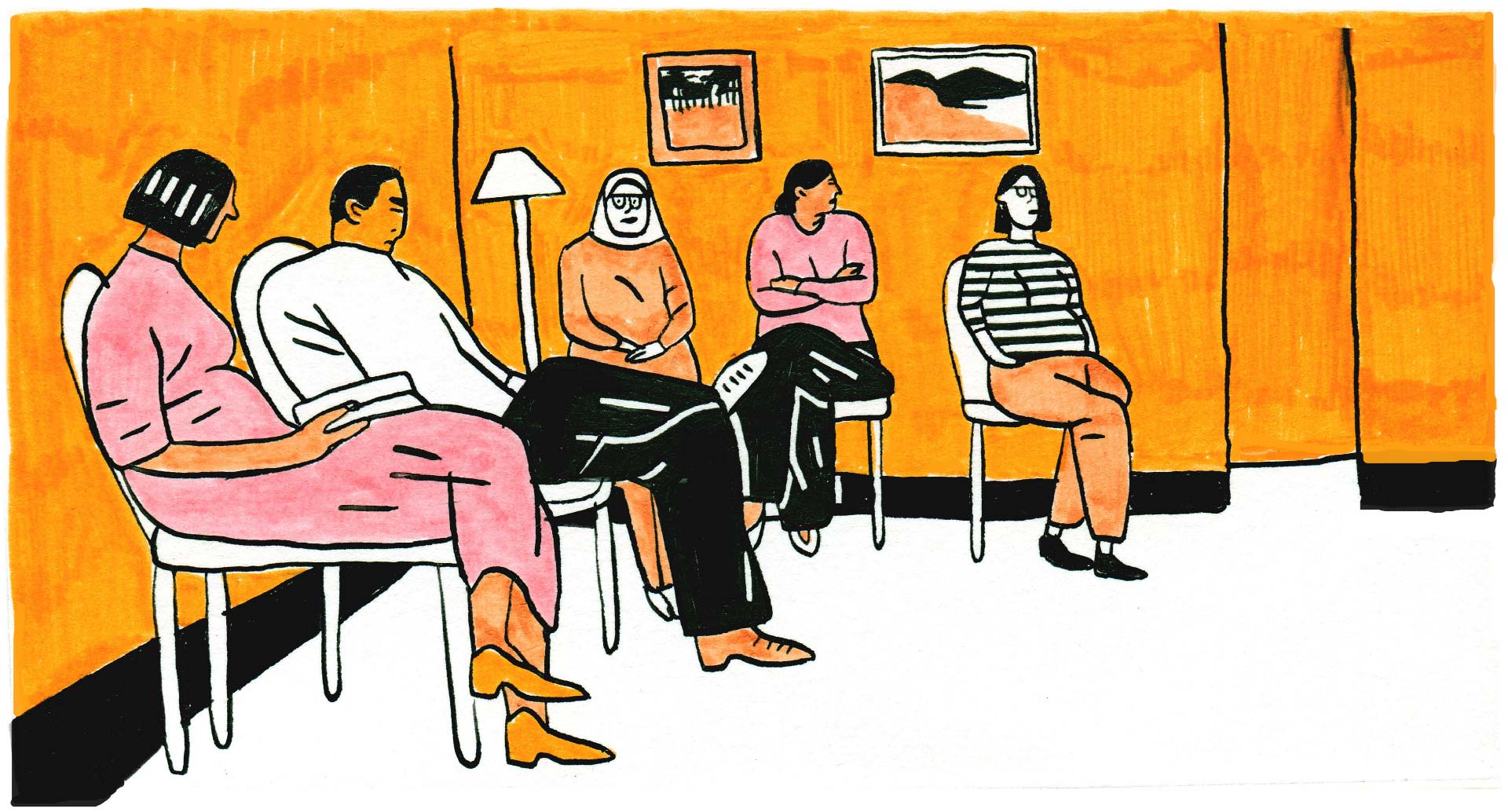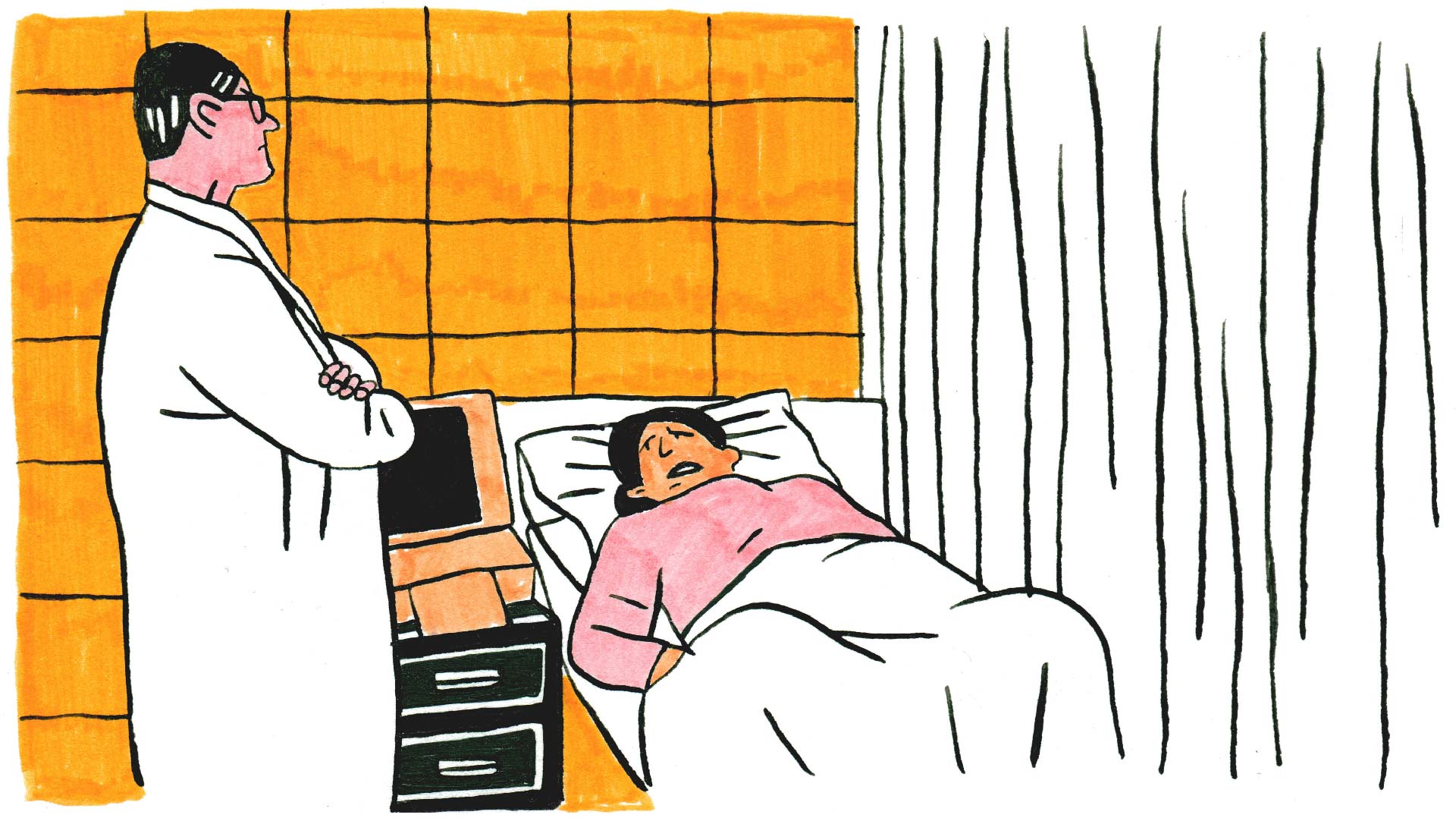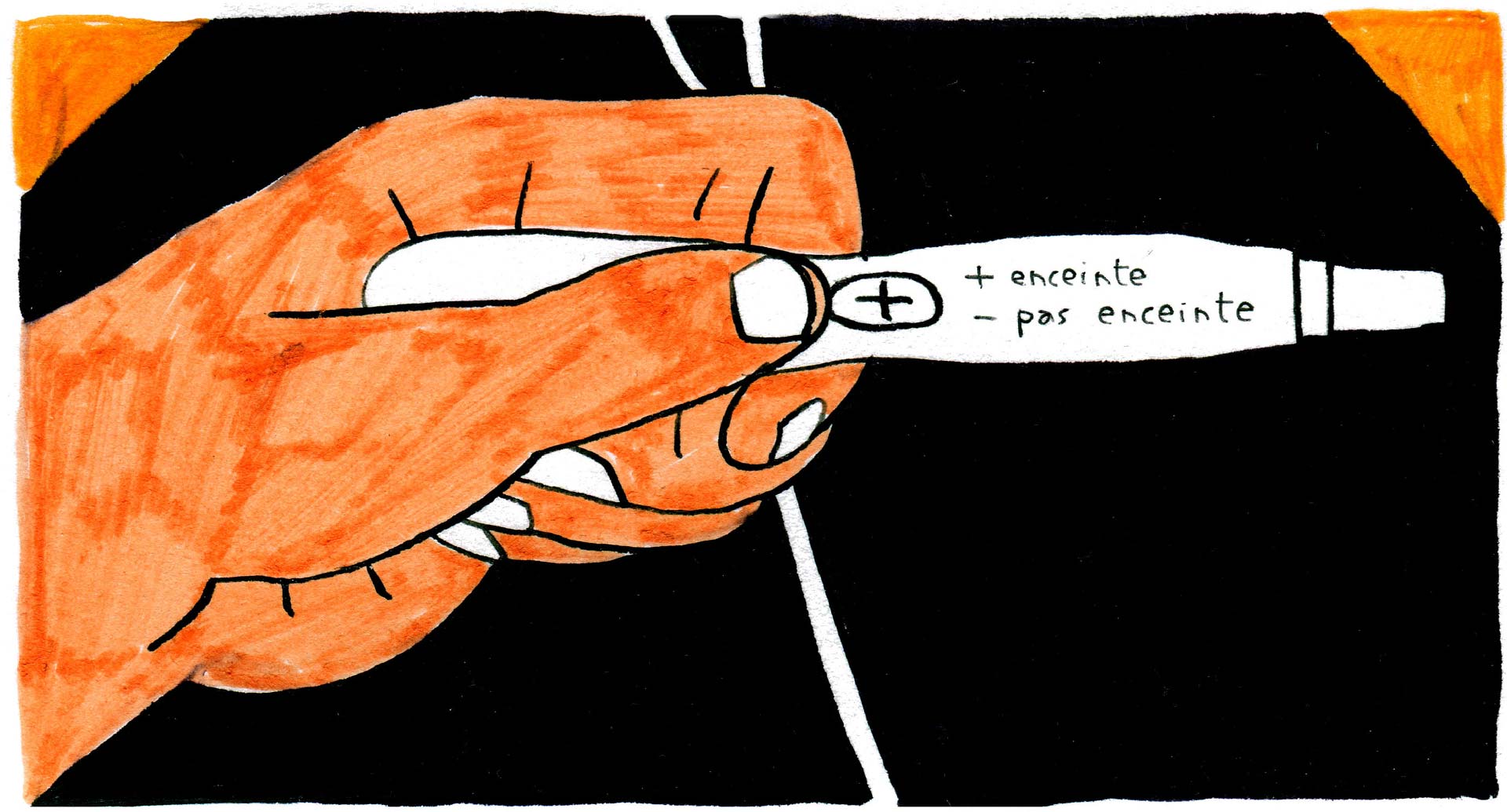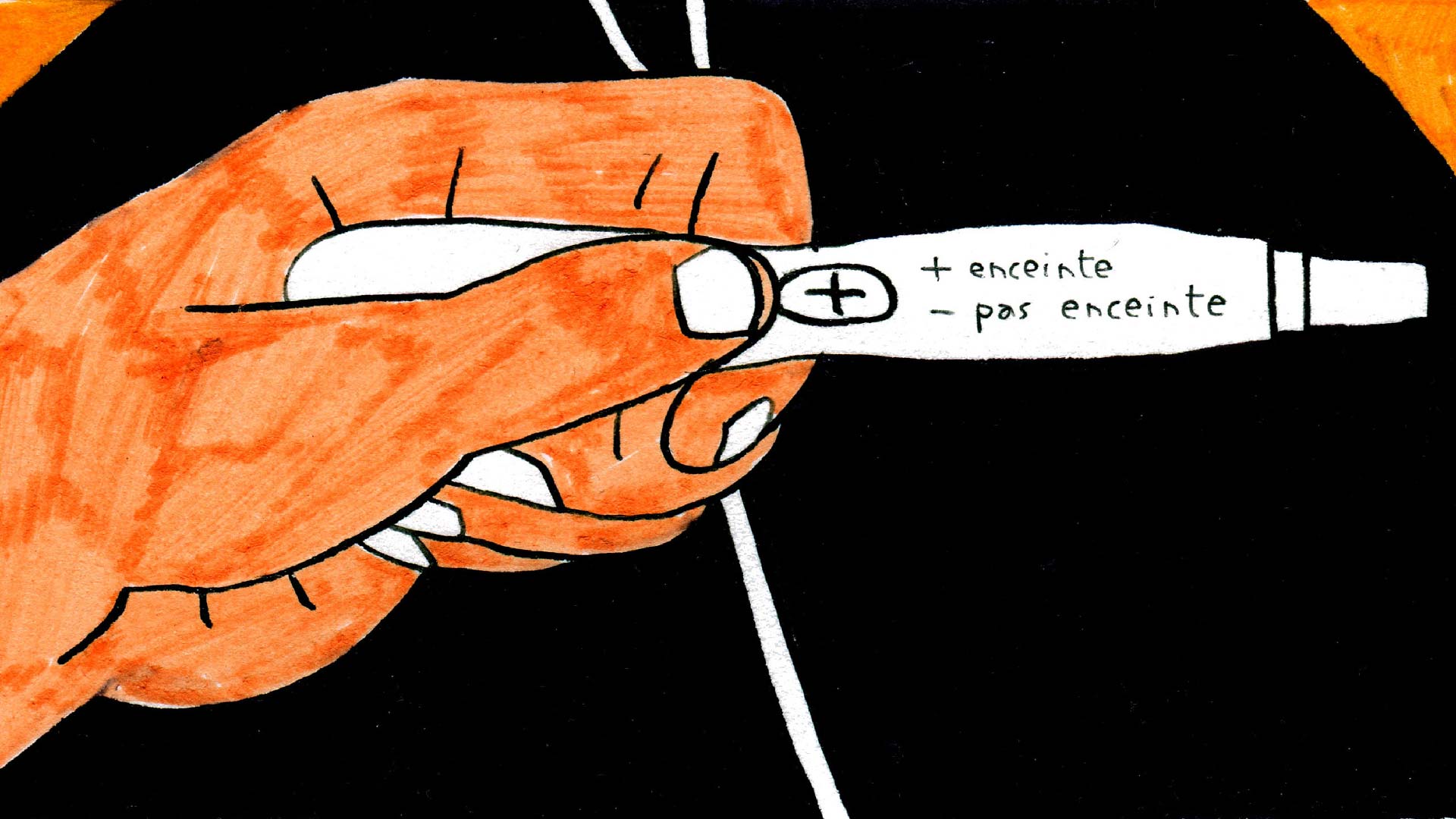
Nadia, sitting at the back of the family planning waiting room, patiently anticipating her abortion.
Sitting on a leather couch, Nadia tries to remember. The stories of her several abortions are so similar that they intertwine. " Each time, I went through personal... social difficulties," explains Nadia, " And then there's the societal pressure. When a woman wants to have an abortion, her family insists, 'Keep it, we're not aborting a little child. This can often end up changing your mind.” Nadia did in fact change her mind, once.
FROM PRIVATE GYNECOLOGIST TO FAMILY PLANNING
Nadia had been with her boyfriend for four years when she first got pregnant. At the age of 25, this self-assured woman found herself at a complete loss: " Because of the utter lack of sex education in our society, I was completely unprepared. I was shocked, and honestly afraid of my family," she admits.
Nadia knew of some contraceptive methods, but like her boyfriend, Anis*, she didn't really know how to properly use a condom. " We're not taught about contraception," she says, so when she found out she was pregnant, and the two felt unprepared to have a child, they decided to seek out an abortion. After managing to set aside a substantial amount of money for the procedure, Anis accompanied Nadia to a private gynecologist.
At the clinic," The gynecologist told me it wasn't a big problem, that I was only two months pregnant." But as the medical examination went on, the doctor realized that the couple was unmarried. " Her demeanor changed from then on," says Nadia.
" She told me, 'No, don't go through with this. Try to get married. It's not right.'"
" I didn't like her reaction, I told her I wasn't ready to be a mother, that I didn't even know if I wanted to spend my life with my boyfriend." The gynecologist eventually refused to perform the abortion and directed Nadia to family planning.
Nadia left the clinic with a referral letter for youth family planning. It stated that she should have a voluntary termination of pregnancy (abortion) as soon as possible, as she soon would no longer be able to.
The psychologist Nadia met with during her first abortion started lecturing her, telling her that it was not right to have the abortion, that it would be better for her to marry her boyfriend and keep the child.
When a woman seeks an abortion via family planning, she has to meet with several practitioners before having the procedure: a psychologist, a gynecologist, and a team of midwives.
The various specialists are there to make sure that the patient truly wants to go through with the abortion and to accompany her throughout the process.
" When a woman wants to have an abortion, she discusses it with the health care staff." explains Dr. Abderrazak Marzouk, a private gynecologist who has practiced in Tunis for about 30 years. " They often come in seeking medical support, already carrying with them a sense of guilt. It’s easy for them to fall into a trap. Sometimes the practitioners give their personal opinion without considering their medical role. "Moralizing has always been very present," he adds.

Nadia, in a gynecological consultation, subjected to the doctor's moral judgement.
"THIS TIME, YOU WILL TAKE RESPONSIBILITY."
Some time later, Nadia finds herself pregnant as a result of contraceptive failure, a broken condom. This time, she turns directly to family planning for the abortion.
" It was more of the same story. The psychologist was shocked that I was asking for another abortion. She knew that I had already had a medical abortion the previous year," she says. " She told me, 'I won’t talk to you anymore, you're not a normal girl. This time you'll have to take some responsibility, we'll give you a surgical abortion.'" The gynecologist agreed with the psychologist.
" I saw it as a punishment," says Nadia. " But as I wasn't able to take on the responsibility of a child, I went through with the tests to have the operation." She was only one month pregnant, and could easily have gotten a medical abortion.
" In my office, I administer medical abortions for women up to 7 weeks pregnant, with a one-week reflection period," explains Dr. Marzouk, who has been performing these operations for more than 20 years. " A medical abortion is much simpler to perform, there are no risks. With surgical abortions, there are possible complications," he notes.
Following a recommendation for another family planning gynecologist, Nadia ultimately got a medical abortion. " He told me, 'It's your body and your choice. I'll give you the medication for the abortion. You're still within the time frame, you don't need to go through surgery,’" she recalls.
Still, the derogatory remarks did not cease. One nurse even implied that she was “ loose,” but Nadia did not let the comment slide and threatened her with legal action.
" I made it clear that she had no right to talk to me like that, that I am in control of my own body and that I would press charges against her if she continued."
On another occasion, during the follow-up ultrasound, she was asked to wait three weeks until her pregnancy was more advanced before proceeding with the abortion. The midwives told her that they were unsure of whether the pregnancy was normal or ectopic. " Personally, I don't buy it. The fetus was clearly visible, the delay was merely a punishment." Three weeks later, she was able to obtain a medical abortion, after yet another moral lecture from the medical staff.
After an abortion, the doctors often request a follow-up visit. This is an opportunity to discuss new ways to approach contraception, but after a few visits Nadia had still not been prescribed anything. With her level of education and profession, she did not fit into their " stereotype" of women who have multiple abortions. " In their eyes, I'm not the type of woman who this usually happens to."
But after this abortion the doctors administered an implant, a long-term contraceptive. To Nadia, it felt like a punishment. Inserted under the skin on the arm, it is not the type of contraceptive that can be terminated at any given time, like a pill or a condom.
For the first few abortions, Anis, her boyfriend, accompanied her to the family planning clinic. The young man also got his share of reprimands. " It's not normal to do this." " You're killing a fetus." " Try to convince your girlfriend to keep it and get married." "We will help you with the baby." As the couple had only been together for a few years, they hadn’t felt ready to take that step.

Nadia finds out that she is pregnant once more through a pregnancy test.
THE FAMILY INFLUENCE
Way before getting pregnant for the first time, Nadia was afraid of losing her virginity, it was taboo. " My family doesn't know about any of this. And if anyone finds out, they'll give me a very hard time."
Nadia eventually married Anis and, as a married woman, dared to talk to her mother-in-law about wanting an abortion when she got pregnant once again. " She works in a hospital and told me that she was willing to help me, even if illegally, to obtain a medical abortion. I just had to take the tests first," says Nadia.
" In the meantime, my father found out that I was pregnant, and pressured my husband and l to keep the child." Under intense pressure from the family, the young woman ultimately kept it.
Since Nadia got married, the moral lectures started to subside. She had a son, and when the child was one-year-old, she got pregnant again. One Friday, she returned to terminate the pregnancy at a family planning office. The gynecologist, the psychologist, as well as the midwife, " all teamed up to try to convince me to keep it," says Nadia.
" They told me that it was normal to be afraid, that I was still young - that God provides children with all that they need when they enter the world, food etc., that it would be easy."
Nadia had to justify her choice to have an abortion: a blood test proving her fragile health condition (having had a C-section too recently to bear a new child), details about her relationship, etc. " It's my private life, I shouldn't have to defend myself like this," Nadia says angrily. After a short conversation, the gynecologist finally declared: " It's Friday and I won't do things that condemn me to hell, it's sacrilegious." That was one step too far for Nadia. "I told her she had no right to deny me on the basis of religion." " I don't fear the law, only God," the gynecologist replied, scheduling a new appointment for the following Monday.

Nadia, in a gynecological consultation, discussing various methods of contraception.
THE LACK OF SEXUAL EDUCATION
Nadia having gone down this road is largely due to a lack of access to sexual education. As a middle-class university graduate, her family had reiterated since childhood, " You're the eldest child.You only have to focus on one thing in life: remaining a virgin before marriage," anything more than that was taboo at home.
According to Dr. Marzouk, there is a severe lack of sexual education in schools. Even if it theoretically exists, " it is not always taught well, because it's within the realm of natural sciences," the doctor says. " Typically, you can consult the designated school nurses on the topic if needed, but often these women don't have sufficient knowledge about contraception," he says.
" The purpose of contraception is precisely to prevent abortion, [but] if I hadn't gotten pregnant, I would never have learned about all these things," says Nadia.
Following an abortion, the patient has to discuss contraception with their doctors. " At family planning, they can then forcefully administer contraceptives, such as the injectable pill, which is effective for three months," explains the private gynecologist, "In the private sector, you can only offer the patient advice.”
" One might have expected a decrease in the number of abortions since the development of contraceptives, but this is not the case," laments Dr. Abderrazak Marzouk. The gynecologist estimates that each year between 12,000 and 15,000 abortions are performed in Tunisia. According to the National Office for Family and Population (ONFP), nearly 16,000 women had abortions in 2015.
The legal framework
The right to abortion, without conditions, is defined by article 214 of the penal code, amended in 1973:
"
Anyone who, by means of food, drink, medicine or any other method, procures or attempts to procure an abortion for a pregnant or presumed pregnant woman, whether or not she has given her consent, shall be sentenced to five years of imprisonment and
a fine of 10,000 dinars, or to one of the two. A woman who obtains or attempts to obtain an abortion, or who consents to the use of the methods indicated or administered for that purpose, shall be sentenced to two years of imprisonment and
a fine of two thousand dinars, or to both. Artificial termination of a pregnancy is permitted when it takes place within the first three months in a hospital or health facility, or in an authorized clinic, by a doctor legally practicing this profession.
The termination of a pregnancy may also be carried out after the initial three months if the mother's health or mental stability is likely to be compromised by the continuation of the pregnancy, or if the unborn child is at risk of suffering from a serious illness or disability. In such cases, it must be carried out in an establishment approved for this purpose. The termination referred to in the preceding paragraph must take place upon presentation of a report from the attending physician to the physician who is to carry out the said termination.”




